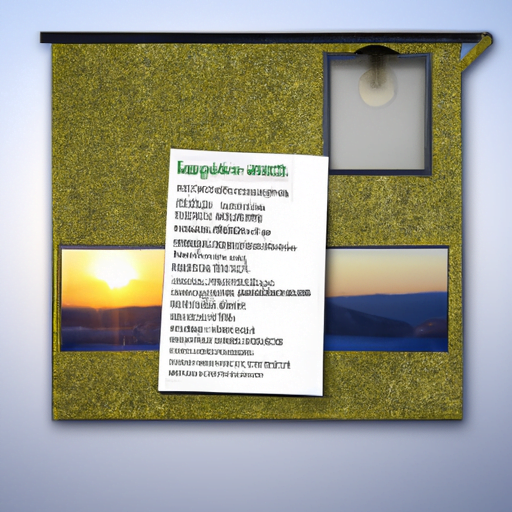Ever wondered what it would be like to live off the grid? You know, no electricity, no running water, just you and nature. It may sound daunting to some, but to others, it’s the ultimate adventure. You might have questions like: what happens when you go off the grid? How would you survive without all the modern conveniences? Well, in this article, we’ll explore the world of off grid living and delve into the fascinating details of this unconventional lifestyle. So, get ready to embark on a journey into the uncharted territory of life off the grid.
When you go off the grid, you’re essentially disconnecting from the traditional power grid and relying on alternative sources of energy. You’ll have to rely on solar panels, wind turbines, or even generators to generate electricity. As for water, you’ll have to rely on rainwater harvesting or wells. It’s a complete lifestyle change that requires adaptability, resourcefulness, and a deep connection with nature.
Living off the grid means embracing simplicity and self-sufficiency. You’ll learn to appreciate and utilize natural resources in ways you never imagined before. From growing your own food to using composting toilets, you’ll become more in tune with the environment around you. By disconnecting from the modern world, you’ll have the freedom to live a life free from bills, stress, and constant distractions. In our upcoming article, we’ll delve deeper into the challenges and rewards of off grid living, so stay tuned to learn more about this unique way of life. When you hear the term “off grid living,” you might envision a life secluded from society, with no access to electricity, running water, or modern conveniences. But what does it truly mean to live off the grid? In this article, we will delve into the world of off grid living and explore the advantages, challenges, and rewards it brings.

What is off grid living?
Off grid living refers to a lifestyle choice where individuals or communities choose to disconnect from the traditional power grid and become self-sufficient in terms of energy, water, and food. It is a conscious decision to reduce reliance on centralized systems and embrace autonomy in meeting basic needs.
Advantages and disadvantages of off grid living
Living off the grid offers a multitude of advantages. Firstly, it allows individuals to have a greater sense of independence and control over their lives. You are no longer bound by the whims and limitations of utility companies or local infrastructure. Instead, you are empowered to generate your own power, collect and purify your water, and cultivate your own food.
Another advantage is the ability to reduce your environmental footprint. By utilizing renewable energy sources such as solar or wind power, off grid dwellers are able to significantly reduce their carbon emissions. Additionally, growing food locally and implementing sustainable farming practices can help preserve the environment and promote a greener lifestyle.
While the advantages of off grid living are plentiful, it is important to be aware of the challenges as well. One of the main hurdles is the initial cost of setting up an off grid system. Investing in solar panels, batteries, and other necessary equipment can be quite expensive. However, it is essential to view this as a long-term investment that will pay off in terms of reduced utility bills and increased self-sufficiency.
Another challenge is the potential for limited resources and isolation. Depending on the location you choose for your off grid home, access to amenities such as grocery stores or medical facilities may be limited. This requires careful planning and preparation to ensure you have enough supplies to sustain yourself during times of scarcity. Additionally, living in remote areas can lead to feelings of isolation. However, many off grid dwellers find solace in the peace and tranquility that nature provides.
The mindset required for off grid living
Living off the grid requires a unique mindset that emphasizes adaptability, resilience, and self-reliance. You must be willing to embrace a simpler way of life and be open to learning new skills. From learning how to harvest rainwater to growing your own food, off grid living demands a hands-on approach and a willingness to tackle challenges head-on.
It is important to manage your expectations and understand that off grid living is not always glamorous or easy. It can be physically demanding at times and requires dedication and hard work. However, the rewards are plentiful for those who are willing to put in the effort.
Building a Sustainable Off Grid Home
Choosing the right location for an off grid home is the first step towards building a sustainable and self-sufficient lifestyle. Factors such as access to sunlight, water sources, and the possibility of growing food should be taken into consideration. While remote locations may provide the utmost solitude, they can present logistical challenges in terms of transportation and access to resources.
One of the key aspects of off grid living is utilizing alternative energy sources for your home. Solar power is one of the most common choices for off grid dwellers. With advances in solar technology, it has become more affordable and efficient than ever before. Other options include wind power and hydroelectricity, depending on the availability of natural resources in your area.
Designing an eco-friendly and self-sufficient off grid home is essential for long-term sustainability. This involves implementing energy-efficient building materials, utilizing passive heating and cooling techniques, and maximizing the use of natural light. Additionally, incorporating water-saving fixtures and implementing proper insulation can help conserve resources and reduce energy consumption.
Water and Food Solutions for Off Grid Living
One of the primary concerns when living off the grid is ensuring a reliable and safe water supply. Off grid dwellers often rely on rainwater collection and filtration methods as a source of potable water. Installing a rainwater catchment system, which consists of gutters and storage tanks, allows you to collect and store rainwater for later use. Water filtration systems, such as sediment filters and UV sterilizers, are then used to ensure the water is safe for consumption.
Growing your own food is another critical aspect of off grid living. By cultivating a garden and implementing sustainable farming practices, off grid dwellers can achieve food self-sufficiency. This involves choosing appropriate crops for your climate, practicing composting, and utilizing natural pest control methods. Additionally, raising livestock and learning basic food preservation techniques, such as canning or fermentation, can help secure food sources throughout the year.

Challenges and Rewards of Off Grid Living
Living off the grid presents unique challenges that require resourcefulness and adaptation. Limited resources, such as water and energy, necessitate careful management and conservation. It requires individuals to be more mindful of their consumption patterns and make conscious efforts to reduce waste.
Isolation and limited social connections can also be challenging for some individuals. However, many off grid communities have formed where like-minded individuals come together to share resources, knowledge, and support. These communities offer a sense of belonging and camaraderie that can help alleviate feelings of isolation.
Despite the challenges, the rewards of off grid living are immeasurable. The sense of freedom and self-sufficiency gained from generating your own power, growing your own food, and living in harmony with nature is unparalleled. Off grid living allows individuals to reconnect with the natural world, fostering a deep appreciation for the environment and promoting a sustainable lifestyle.
Off Grid Technologies and Innovations
Advancements in off grid technologies have made it easier than ever to live comfortably off the grid. Solar power advancements, such as high-efficiency solar panels and improved battery storage systems, have made it possible to harness and store more energy. This allows off grid dwellers to power their homes and appliances even during periods of low sunlight.
Furthermore, innovative off grid appliances and gadgets have been developed specifically for sustainable living. These include energy-efficient refrigerators, stoves, and lighting solutions that help reduce energy consumption. Additionally, portable solar generators and water purification devices have become more compact and affordable, making it easier to access power and clean water in remote locations.
Communication options for remote off grid locations have also improved. Satellite internet and satellite phones provide a means of staying connected with the outside world, even in the most remote areas. This is crucial for emergencies, accessing information, or simply maintaining social connections.
Finding Community in Off Grid Living
Living off the grid doesn’t mean living in isolation. Many off grid communities have formed worldwide, where individuals come together to share resources, knowledge, and support. These communities provide a sense of belonging and provide a support system for those navigating the challenges of off grid living.
Sharing resources is an integral part of off grid communities. This can include sharing tools, equipment, or surplus food with neighbors. By pooling resources, off grid dwellers can reduce costs, minimize waste, and create a more sustainable and interconnected way of life.
Maintaining social connections while living off the grid is also important. With advancements in technology, it is easier than ever to stay connected with friends and family through video calls and social media platforms. This helps combat feelings of isolation and ensures that the off grid lifestyle does not hinder relationships.
Exploring Alternative Off Grid Lifestyles
Off grid living is not limited to a specific type of dwelling. Many individuals have embraced alternative lifestyles that veer away from traditional homes. Living on a boat or in a tiny house off the grid has gained popularity as a minimalist and ecologically-friendly choice. These compact living spaces are designed to be energy-efficient and require minimal resources, making them ideal for off grid living.
Nomadic off grid living and van life have also gained traction in recent years. Mobile homes and converted vans offer the flexibility to travel and explore different off grid locations while maintaining a self-sufficient lifestyle. These lifestyles appeal to those who crave adventure and the freedom to roam.
Other unique off grid living options include earthships, yurts, and cob houses. These environmentally-friendly and sustainable dwellings utilize natural and salvaged materials, creating low-impact homes that blend harmoniously with the natural surroundings.
Legal and Regulatory Considerations for Off Grid Living
Before embarking on an off grid lifestyle, it is important to understand the legal and regulatory considerations that may arise. Navigating zoning and building codes can be a complex process, as many regulations are designed to accommodate traditional, grid-tied homes. Some areas may have restrictions on building structures that are not connected to the grid or have size limitations for alternative dwellings.
Obtaining the necessary permits and complying with regulations is crucial to ensure that your off grid home is built safely and legally. Researching local laws and consulting with experts or professionals can help you navigate the process smoothly.
It is also important to consider legal aspects related to off grid living, such as property rights, waste management, and water usage. Understanding the regulations and complying with them will help you avoid potential legal issues in the future.
Off Grid Living: Myth vs Reality
Off grid living is often surrounded by myths and misconceptions. It is important to dispel these myths and address the realities of off grid living. Contrary to popular belief, living off the grid does not mean living in poverty or depriving yourself of modern conveniences. With advances in technology and sustainable practices, off grid dwellers can enjoy a comfortable and fulfilling lifestyle.
While there are challenges and limitations associated with off grid living, such as limited resources and isolation, these can be overcome with careful planning, resourcefulness, and the support of off grid communities. Learning from the experiences of others who have embraced off grid living can provide valuable insights and help dispel any anxieties or doubts.
Real-life stories and experiences of off grid dwellers can serve as inspiration for those considering a life off the grid. These stories highlight the freedom, connection with nature, and the sense of accomplishment that comes from living a self-sufficient lifestyle. They remind us that off grid living is not just a lifestyle choice, but a way of reconnecting with nature and embracing a simpler, more sustainable way of life.
Conclusion
Exploring the uncharted territory of off grid living opens up a world of possibilities and rewards. It offers a unique way of life that is in harmony with nature, fosters self-sufficiency, and reduces our impact on the environment. While not without its challenges, off grid living provides a sense of freedom, connection, and fulfillment that is often lacking in traditional, grid-tied lifestyles.
By choosing to disconnect from the grid and embrace an off grid lifestyle, you can create a sustainable and self-sufficient existence that prioritizes environmental consciousness and personal autonomy. Whether it is by generating your own power, cultivating your own food, or joining an off grid community, off grid living allows you to embark on a journey of exploration, self-discovery, and a deeper connection with the natural world. So, are you ready to explore the uncharted and embrace a life off the grid?




